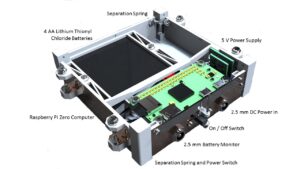As members may have read in ‘Odyssey’ and elsewhere, very sadly Sarah Henley, leader of the Science Fiction virtual branch, passed away at the start of July. She was keen and full of ideas for this, the first of our virtual branches, and will be greatly missed. Thus, we are looking for a new leader for this virtual branch. If interested, please let us know during the online social.
However, building on this foundation, the Science Fiction virtual branch breakout room continues, and should again be a forum for some sparkling conversation!
The next meetings of the ‘Future Propulsion virtual group’, and the ‘Space Law and Space History’ virtual group’ will also take place as before, by means of dedicated breakout rooms.
In addition, discussion will continue on the formation of other possible new virtual special interest branches and groups, such as Space Art and Culture, Human Spaceflight, Practical Projects, Interstellar Studies, a Wales/Bristol branch and Lunar Studies. (In particular, there are ongoing discussions on a possible Bristol/Bath branch, if interested please do attend and let us know.)
This is an opportunity to pursue your particular interest!
And would you be interested in helping design and test a space satellite? The BIS ‘hands-on’ Q-Cube Technical Project is seeking volunteers to help complete the project. The objective is to develop a small satellite bus that  would weigh around 300 grams and could easily be made for under £200. This would make it suitable for secondary school and university undergraduate projects. To reduce launch costs it is expected these Q-Cubes will be launched in clusters, four of the Q-Cubes will fit into the form of a standard Cubesat. The project will produce two prototype satellites, one made in Britain and the other in Italy. The British Q-Cube will use a Raspberry Pi Zero as its control processor; this should be easier for entry level projects and is a computer already widely used in UK education. The Italian Q-Cube will use an Arduino micro-controller; this should provide a faster and lower power consumption alternative to the Raspberry Pi for more advanced projects. For simplicity the satellite is powered only by batteries giving it a life of around three days. The plastic structure is made by 3D Printing and then covered with copper foil to provide the electrical ground plane; a technology already proven by a test structure.
would weigh around 300 grams and could easily be made for under £200. This would make it suitable for secondary school and university undergraduate projects. To reduce launch costs it is expected these Q-Cubes will be launched in clusters, four of the Q-Cubes will fit into the form of a standard Cubesat. The project will produce two prototype satellites, one made in Britain and the other in Italy. The British Q-Cube will use a Raspberry Pi Zero as its control processor; this should be easier for entry level projects and is a computer already widely used in UK education. The Italian Q-Cube will use an Arduino micro-controller; this should provide a faster and lower power consumption alternative to the Raspberry Pi for more advanced projects. For simplicity the satellite is powered only by batteries giving it a life of around three days. The plastic structure is made by 3D Printing and then covered with copper foil to provide the electrical ground plane; a technology already proven by a test structure.
For more information and how to join, please attend the main online social discussion.


